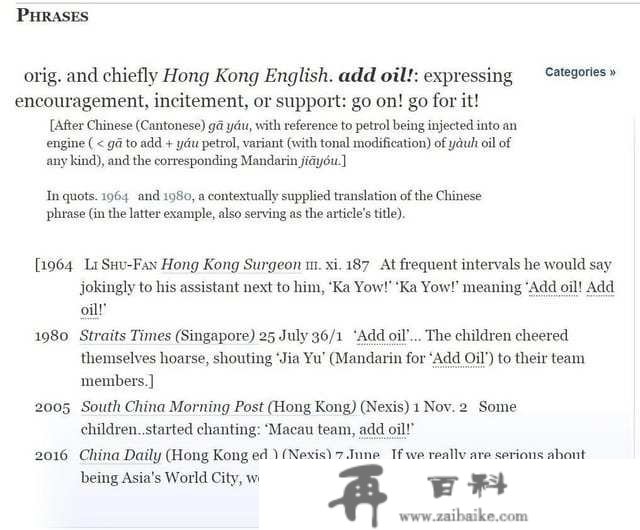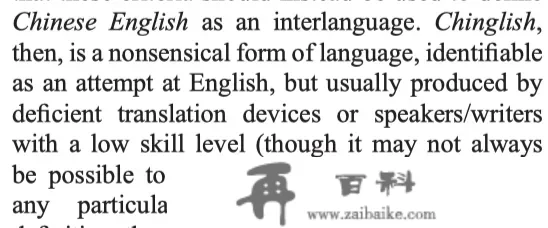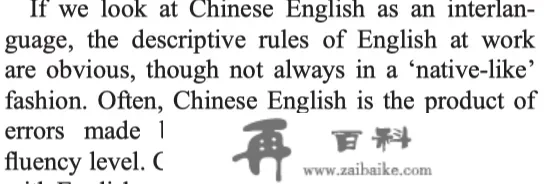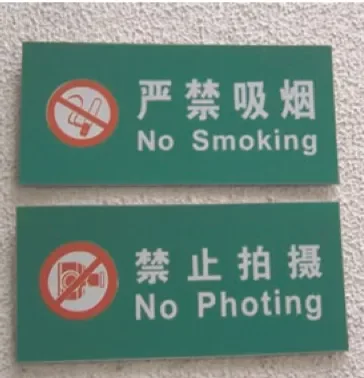中式英语(Chinglish)和英美式英语(English)有何区别?
谢邀,不断认为,只要你起头学英语,启齿说英语,你根本就会听见来自四面八方的声音,
“你那个口音实的是,好中式啊。”
“你那句子也太中式了,你再碰运气翻译一下”
“儿子,你那读的是个洋泾浜英语诶”
….
在我们的记忆里语言口音鄙夷链的更底端就是Chinglish(顶端的英美口音老是掐架,内部还搞团结,而北欧口音在一旁高冷不说话….),“不地道”的中国语法用词和汉语体例的发音,不只教师听了不给高分,伴侣听了忍俊不由,外国人听后的满脸问号,也会使我们无地自容。
简单而说,中式英语就是我们中国人习习用本身的语法,逻辑思维,将一些英文表达带上汉语陈迹,以至良多语言都根据中式翻译的办法一板一眼停止,因而不容易被以英语为母语者所承受。
不外想必各人都传闻了比来“add oil”进入牛津词典的动静:

感激呈现在quotation里的 Hong Kong Surgeon, Strait Times (Singapore), South China Morning Post (Hong Kong) and China Daily (Hong Kong ed.)等各类前言尽心尽力地勤奋
那刚好就验证了语言的开展的一句话“an increase in the number of non-native speakers in a language can lead to changes in morphological rules.”(Cuskley et al., 2015) 语言的开展老是与时俱进的。
我们良多国人都看不起中式英语,但是不断强调的中式英语,到底哪些能被称为“中式英语”?不是一旦发音欠好语言有误,就要被打上“中式英语”的标签,下面我们系统地学一学Chinglish。
Chinglish, China English and Chinese English别小看那三个词的微妙不同,他们反响的是三个差别境界的中国人英语才能。出名语言学家Meagan Eaves(2011)的描述,是那么定义那三种语言形态的:
Chinglish

Chinglish是中文利用者用英文词汇,根据中文发音和语律例律构成的英语语言,试图切近英文尺度,但遗漏良多。与Chinese English比照,不克不及算是一种可理解的语言…只能算是由不成熟的利用者或翻译东西产生的英语测验考试。
她也给出很多例子,如


(据说拍摄于北京某胡同)
Chinese English
Chinese English是一种fluency level的进修者说出来的略带错误的英语,已经很切近英语的规则了。那里次要有三个方面的特点,别离是借用中文的形态、通过英文形态拓展,以及用已知的语法表达
 借用中文形态
借用中文形态You bring us happy. Where have you where have happy.
拓展英文形态But this year, I know, in the future, if you don’t speak English, you can’t find a good work. So now I study English very carefully, and I want everyone can help me.
操纵已知语法 China English
China English

可见,China English已经被上升到了一种一般的在英文文化多样性的拓展上,是在操纵尺度的英语来表达中国的文化!有三个特点:
varied pronunciation and accent, particular lexical items 经本土化的发音与口音,尤其是语言词汇上的an idiosyncratic syntax 中国特色的语言组织distinct discourse varieties 富有中国特点的演说/阐述varied pronunciation and accent, particular lexical items 经本土化的发音与口音下面三个是中国人说英语时会因为中文发音习惯的影响,而本身改动的英文发音
/θ/ → /s/因为中文里没有咬舌/θ/
/ð/ → /z/ or /ð/ → /d/原因同上
/kæt/→ /kætə/,爆破音结尾加/ə/
autonomous region自治区
colour wolf色狼
dragon boat龙舟
little red cap小红帽
Mid-Autumn festival 中秋节
one country two systems 一国两造
red envelope 红包
special administrative region 出格行政区
那些例子的特点就是在英文为母语的人看来能够看懂且语法没什么错,但表达体例一看就是切近中国文化和中国国情的,那些例子也确实都是我们看到过的对应中文的英文正式表达。
an idiosyncratic syntax 中国特色的语言组织e.g.
As I am currently in China with an ABQ delegation doing projects of business, medical consulting, fashion-textile design, and Chinese investment to the US, I could not come myself.
而英文习惯表达为:
I could not come myself, as I am currently in China with an ABQ delegation doing projects [. . .]
e.g.
Because he can not reply you in time, I contact you directly. I hope my English won’t let you down.
那两个都是根据了中文的语序,把暗示“因为”的because与as都放在了句首
distinct discourse varieties 富有中国特点的演说/阐述在中国人的英文演说中,虽然载体是英文,但会带有很深的中国文化的影子,下面那个邮件规范就很好论述了“体面”文化在中国的影响
Salutation: Hello . . .
Facework: I am [author] (I am Chinese), the colleague of [name] (our foreign advisor). Because he can not reply you in time, I contact you directly. I hope my English won’t let you down.
Reason/Justification: It was a long time since my last mail. We are so glad to hear the news that you agree to write for us. Your experience and story is very valuable for our website and tourists. We are hoping to get your story as soon as possible. We will pay you due the time we got the story. [sic] So don’t worry about that. We have been in business since 1998 and enjoy high reputation home and abroad. I appreciate your writing style and creative idea. It is a happy experience to write to you.
Request: So could you tell me how many stories do you have in hand or be going to write? What price do you charge for your story? When can you finish your story and send it or them to us?
Sign off: I am looking forward to your reply!
Best wishes,
Author
阐发下构造,起首,演讲人问候并致敬,接下来就起头做facework:自谦为先,再接下来,夸赞对方的experience and story,赏识对方的writing style与缔造性,再最初提出些询问,结尾。
所以总结,以英文尺度度为原则,从最不尺度到比力尺度,显然次序是
Chinglish<Chinese English<China English
一些常用且已被公承认行的Chinglish/Chinese English/China English集锦中式英语在良多时候被带上了贬义色彩,安心,今天我告诉你的重点就是,以下词汇能够安心利用
2.1 香港地域
Shroff [shrof] noun, a banker, cashier or money changer, and also an expert employed to test the base metals of coinage. 来自1800年代一家从印度来到香港的家庭,其后嗣Jal Shroff后将印度的Western Union-esque 货币转账营业带到了香港,后拓展到整个东亚Nullah: [nuhl-uh] noun, 也是来源于印度,意味香港独有的下水道Cumshaw [kuhm-shaw] noun, 小恩小惠,a classic example of pidgin English, a distinct language in itself and the source of many Hong Kong English words.Godown: [goh-doun] noun, 小仓库It was adapted in Hong Kong from the Malay word gudang, according to Robert Bauer, an HKU professor and expert on Hong Kong linguistics.Chop: [chop] noun, 图章、印章,公函答应章a seal or impression, stamp or signature, and even a trademark in Hong Kong English. It was also used to denote a legally binding official document or public permit.Amah: [ah-muh] noun, 当地劳动妇女,类似于通俗话“阿姨”a female domestic worker. The word came into use in Hong Kong in the 19th century from the Portuguese ama ("nurse", "wet nurse" or "nanny"), according to Bauer. Nicole Constable, author of Maid to Order in Hong Kong: Stories of Migrant Workers, however, argues that it is a derivative of the old Chinese " ah mah" (阿媽). The word was also commonly adopted in Indian dialects of English as " ayah" and features in the works of British writer Rudyard Kipling.Add oil: [add oil!] verb, 外表上是上光滑油,其实是加油打气literally to lubricate, but used more as an idiom to encourage a team or person. The term has long been limited to the Chinese " ga yao!" (加油), after originating as a cheer at the Macau Grand Prix in the 60s, but Hong Kong is increasingly using the English transliteration.Hea/chur: [Hea middle tone/chur, middle tone] adjectives, 简单容易/严厉困难easy, relaxed or lenient, and hard or strict, respectively. The terms were developed by HKU students to describe their courses.Locust: [lo-cust] noun, 大陆客(带贬义,描述大陆客簇拥香港买工具争夺当地资本)referring to tourists from the mainland and meant to connote both masses and a drain on local resources. The word is derogatory and originated during shortages of powdered milk, which were blamed on mainland parallel traders. It first appeared in the South China Morning Post in March 2011.Fryer/fry stock: [frahy-er] noun, (依靠浮夸的留言而非现实盈利才能)订价的股票identifies a financial investment that has value mostly based on its buzz rather than its underlying earnings; can be interchanged with "wok stock".2.2 从通俗话衍生
You can you up, no zuo no BB= if you cant do it then dont even criticize itNo zuo no dieGuanggun (cited by The Economist)= bare branches, or men who will not add to the family tree) to refer to the "overaged" single maleDama (cited by WSJ)Tuhao (cited by BBC)Fengshui (admitted in Oxford Dictionary)Maotai (admitted in Oxford Dictionary)Ganbu (admitted in Oxford Dictionary)2.3 英文里源自中文的词语 (from Wikipedia)




希望各人对中式英语宽大一点,其实外国人说话也都带着浓厚的口音,良多时候都是本身同胞讪笑本身人,招致越来越多的人不敢启齿,不敢发言,不敢停止表达,以致于如今哑巴英语越来越多。
不外话虽那么说,但那显然其实不代表各人以后随意说Chinglish都legitimate了~
在欢庆中文影响力之强大的同时,我们也不克不及放松去掌握实正英语思维的勤奋,只要如许,才气用外国人听得懂的体例继续发扬我们中文和我们国度的影响力。
那么你呢?你对中式英语的观点是什么?你在日常进修中有被人说过太中式英语吗?欢送评论,告诉学长你的故事。
References:
Bland. D. (2015) Add oil! The evolution of Hong Kong English, and where our unique words come from. Available at: https://www.scmp.com/magazines/post-magazine/long-reads/article/2169154/man-who-has-eaten-more-7300-chinese-restaurants
China Daily USA (2014) Chinglish Gains Popularity Overseas. Available at: http://usa.chinadaily.com.cn/life/2014-05/12/content_17501472.htm
Cuskley, C., Colaiori, F., Castellano, C., Loreto, V., Pugliese, M., Tria, F. (2015) ‘The adoption of linguistic rules in native and non-native speakers: Evidence from a Wug task’ Journal of Memory and Language, 84, pp205-223, ELSEVIER [Online]. Available at: https://www.sciencedirect.com/science/article/pii/S0749596X15000790
Eaves, M. (2011) ‘English, Chinglish or China English?’ English Today: The International Review of English Language, 27 (4[108]), pp64-70. [Online]. Available at: https://www.cambridge.org/core/journals/english-today/article/english-chinglish-or-china-english/AA9B6BAFDEBEE013D8DD2777C9F3620B DOI: 10.1017/S0266078411000563
Wikipedia (2010) List of English words of Chinese origin. Available at: https://en.wikipedia.org/wiki/List_of_English_words_of_Chinese_origin
